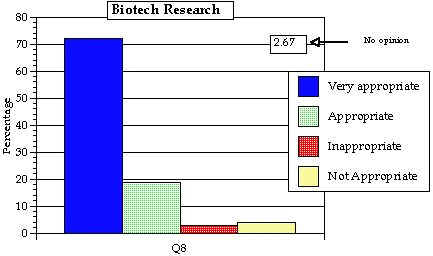
Images
Verbatim comments from curvey results

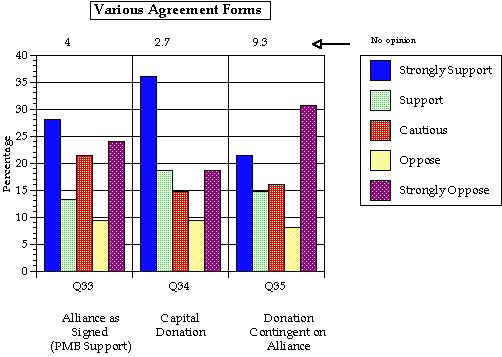
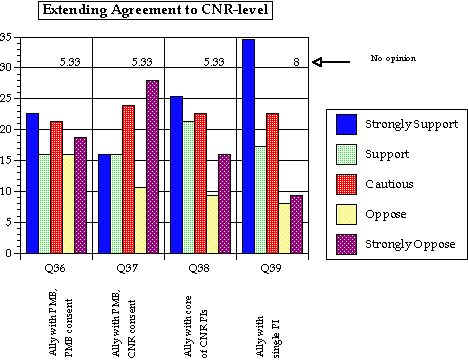
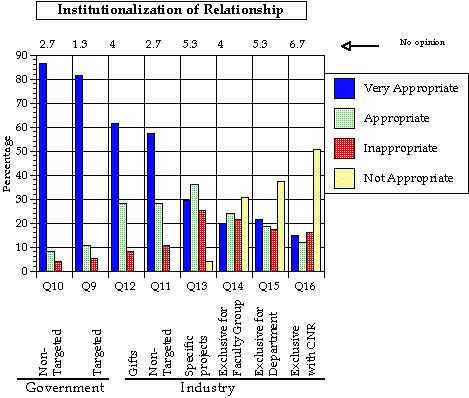
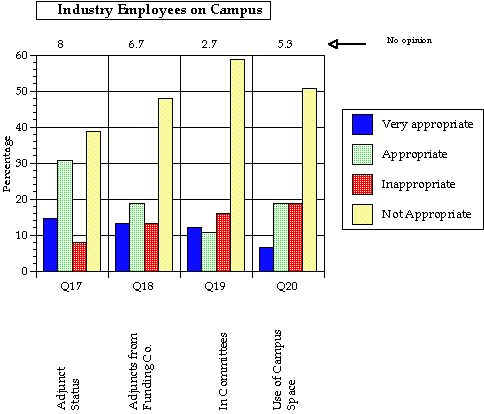
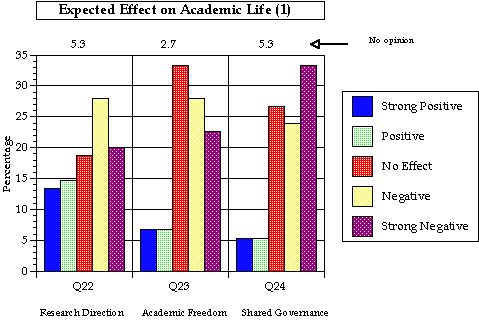
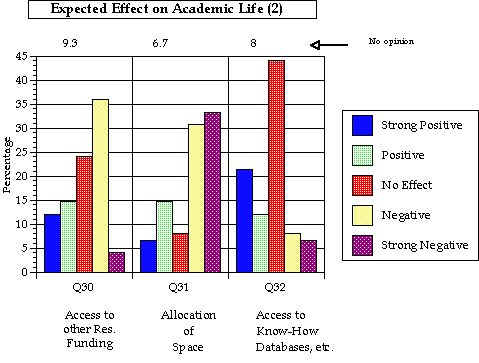
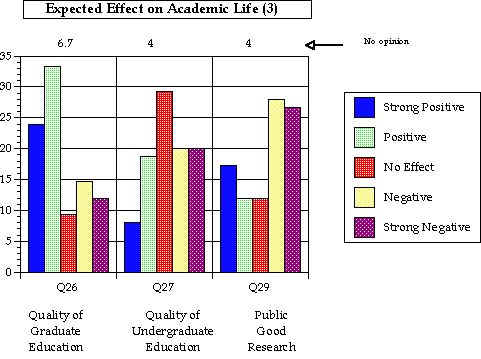
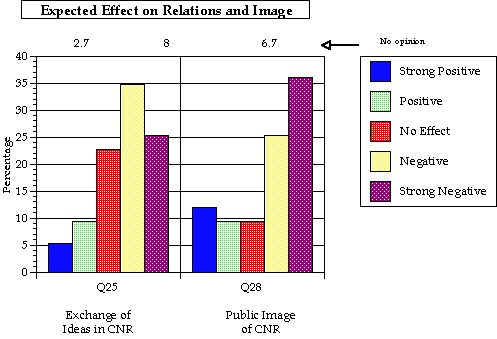
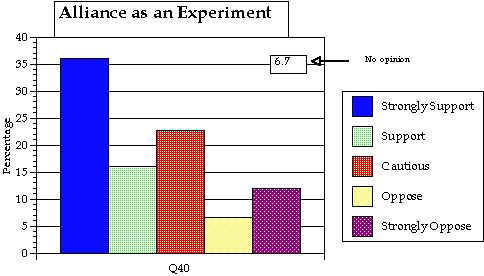
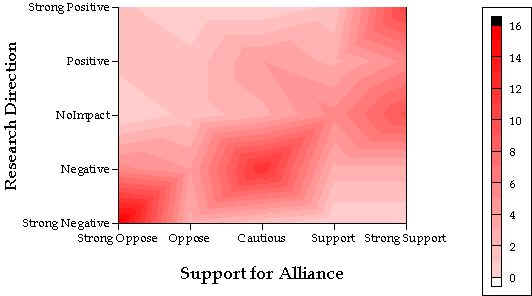
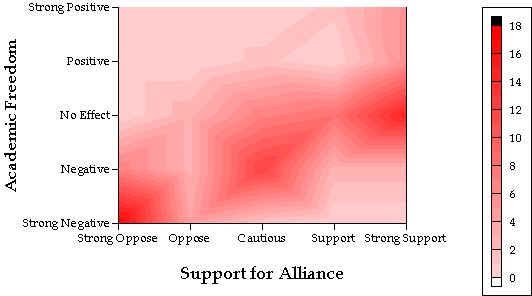
"The most negative aspect of the proposed alliance is that it flies in the face of the basic motivation for the land grant university system and undermines our credibility in the eyes of the public that pays our salaries. I see the ultimate cost to the university as being very high."
"Compromises objectivity and food image of College/University. Supports privatization of public goods: education, research, information (databases and other)."
"Land Grant Ethic."
"Responses to items 15-21 assume conditions as currently understood for the proposed alliance. Without this understanding of the conditions mutually agreed to by the Campus and the company, these statements (15-21) would be unacceptable. I would anticipate that many faculty would rejects them on principle and look no further. In this regards, I question the validity of this questionnaire."
"So long as the agreement is with PMB and Faculty who do not wish to participate do not have to participate, leave it to PMB. Do you really believe the State is going to fund PMB"s research? Please get real."
"Why does Novartis need to be institutionalized within CNR? Why not establish an
institute outside of CNR (e.g. Stanford Research Institute)?"
We should not have presented it as an alliance with the College. It is a PMB deal and good
luck to them. CNR lost in terms of PR, less publicity would have been better for
all."
"It is ironic that I am filling-out this questionnaire after reading in this morning"s newspaper that the deal has been finalized."
"We face three issues now: 1-How to strengthen and use balances and complementarities within CNR. 2-How to monitor the alliance experiment effectively and with accountability to whole CNR faculty. 3-How to create effective undergraduate education in CNR despite this additional blow to the teaching ethic and responsibility."
"If the State won"t support departments appropriately, it is proper for the faculty to seek outside support. The CNR certainly doesn"t support PMB adequately, hence this development."
"The industrial connection should not be permitted to affect hiring, allocation of funds within the College, or teaching - some funds provided, however, should be used to support teaching."
"It will put in stone the already deplorable exploitation of graduate students as a workforce and further drive a wedge between the teaching and research activities of the university. Profit-based businesses are not compatible with academic science. We would be better off letting the whole system collapse financially and start from square one than to go to bed with these firms for a short-term financial fix."
"Too much secrecy. Too much smooth talk by Dean that all our concerns will vanish once the agreement is signed. What BS!"
"I support the Dean"s efforts to develop innovative funding. I am very disappointed with the oversight of the agreement: (1) Novartis membership is high on all committees, (2) CNR membership is weighted with very biased members (Gruissem et al.), (3) Academic Senate oversight is ignored."
"This agreement provides a windfall for a relatively small group of CNR faculty while diminishing the entire College"s reputation as an academic institution and an institution for PUBLIC good."
"For those interested in research in the target area, this may be the only way to fund and perform pioneering research in areas where most cutting-edge research is proprietary and performed in industry. As long as this effort is not allowed to move non-participants out of their space or diminish their support from their traditional sources, I see no reason why it should be any one else"s concern what a group of colleagues wants to do."
"The Novartis-CNR alliance being proposed by the School of Economics and Biotechnology (a.k.a. the College of Natural Resources) is an abhorrent, repulsive abomination. But what can be expected from a college whose faculty has become callused, uncaring, non-collegial and irresponsible; which abides a villainous leadership (which continues to be, deservedly, vilified); and which is supportive of policies and procedures that are unreasonable, egregious and malfeasant. What has happened to honesty, reason, collegiality, our Land Grant University mandate, and concern for the state of our State, our Country, and our world?"
"The alliance has no room in a public university as it will attempt against academic freedom and will bias research toward private interests affecting other public good research. Our CNR should focus on research that the public sector will not do rather than... [text cut]."
"This survey is very highly biased in my opinion. I do not think it provides Faculty with a generalized consensus describing the issues and in general my belief is that the results of this survey will only serve to exacerbate discord among a small core of faculty who are opposed to genetic engineering per se and are proponents of "alternative" agricultural practices such as organic farming. The alliance is clearly a good outcome that will provide much needed resources for an area of research where we have an abundance of ideas whose implementation depends on those resources. The research will create knowledge and extend our ability to incorporate this knowledge into crop improvement."
Shared governance as "a joke". On isolating the agreement to PMB: "Whoever heard of PMB - we all go in the toilet with them." On treating the agreement as a 5-year experiment: "Who are you trying to fool. We may be public school teachers, but we aren"t that dumb."
"If you think I left CNR/UCB in my will after this little pastiche of lies, evasions, half-truths and concealments you are nuts. The cost of raising $ for a few will be borne by us all. I wouldn"t give us 5 cents anymore."
"Academic science and profit-motivated industry firms are basically incompatible. Why should they be permitted to buy their way into a cheap labor force and University resources. Those should be available free to anyone but not to a select sector of the industry just because they have the financial resources to buy their way in. It is just one more form of corruption."
"What is the relevance of question #41?" [Departmental affiliation].
"Alliance between individual PIs or groups of PIs are OK. College needs to be more careful."
On adjunct faculty: Appropriate "with review" [quest 17, 18]. On company representation: Appropriate "in a minority." On campus space use by industry: Appropriate "if paid for".
"The word on the street is that microbiologists in other institutions are saying (a) that this is inappropriate in a land grant institution, (b) that the amount of money we got was risible (in comparison to $260 million to UCSD). I am deeply disturbed to learn that 2 of the primary architects of this deal are leaving the university to take jobs in Novartis institutions. This suggests something very unethical about the whole thing. We are already seeing institutional distortion, e.g. the attempt to silence the faculty."
"The "alliance" is ultimately quite simple. A few people gain a lot, and a lot of people lose, to varying extents."
On questions 1-21: "Depends on context."
"Institutionalizing Novartis in CNR is the major concern. The money is chump change to such a large multinational and the potential for corrupting influence large - I saw this in Europe."
"Certainly the communication with the Dean’s Office was terrible. We went from a hypothetical "what if" to a "done deal". This has tremendous potential for a major public relations bomb for UC Berkeley and the College."
"The missing question: what system of safeguards and evaluations would be sufficient?"
"Sets a bad precedent. Intangible and invisible impacts."
"The influence of the Alliance will most likely be positive in the short run, but potentially negative in subtle ways in the long run. Given the increasing corporate approach of the College, the funds are expected to alter variables such as space allocation, faculty hiring priorities and approvals at the Dean"s level, and relative future resource allocations. While perhaps necessary, these funds will not come without a cost to the College."
On adjunct faculty positions (questions 17, 18): Appropriate "if appropriate, i.e. done through existing admin. structure." On use of campus space by industry: "If adjunct faculty."
"This questionnaire leaves out an evaluation of opinion on all really important matters. For example, freedom to choose to license nonexclusively only (to lower IP value for the public good) and special problems linked to use of proprietary databases."
On faculty research direction impact: No impact "on other faculty". On free exchange of ideas in CNR: Negative [3] "but they don"t talk now." On access to other research funding: No impact "for others."
"Arrangements like this may be the only way for MB faculty to do cutting edge research in a field currently dominated by industry. In my experience, most MB folks don"t talk about their work already - no loss. It should be the Dean"s absolute responsibility to assure that agreements with one or a group of PI"s have no effect on other PI"s in CNR."
"Are other depts for sale to the highest bidder?"
"The Novartis-CNR alliance being proposed by the School of Economics and Biotechnology (a.k.a. the College of Natural Resources) is an abhorrent, repulsive abomination. But what can be expected from a college whose faculty has become callused, uncaring, non-collegial and irresponsible; which abides a villainous leadership (which continues to be, deservedly, vilified); and which is supportive of policies and procedures that are unreasonable, egregious and malfeasant. What has happened to honesty, reason, collegiality, support for our teaching responsibilities, our Land Grant University mandate, and our concern for the citizens and environment of our State, our Country, and our world?"
"A job well done!"
"More openness and honesty in the process would have gone far to gather support from CNR faculty, which in turn would have gone far to help public image. Versions from the Dean"s office and from PMB were at odds right until signing - it appears that the PMB version was closer to the truth. In particular the Dean"s Office repeated claims of this as a CNR opportunity were damaging, and suddenly reversed on challenge near signing time. Faculty care about CNR - give them the benefit of openness."
"This alliance is an excellent new opportunity for a public institution to be involved in this area, with public values of what previously had been exclusively private, to be realized."
On adjunct faculty from company providing funds [18]: Inappropriate, assuming that affil. with the company is a requirement for qualification for appointment. Otherwise it"s more appropriate."
On [14-20]: "Depends on" context.
"What are the viable alternatives?"
"Because this is an agreement between the PMB department members and Novartis, the premise for this survey, viz. that other CNR members somehow have a right to have input, is invalid. Therefore, this survey is irrelevant at best, and unprofessionally intrusive on the academic rights of UC Berkeley colleagues at worst."
"The survey is misleading or inaccurate in many regards. So much so that it is an embarrassment to the College and the University. The seriousness of the errors makes the survey almost impossible to fill out."
"The questionnaire is overly simplistic - and has numerous errors and misstatements."
"The Novartis agreements benefit a small group of CNR researchers at the cost of the entire CNR"s reputation. Such an agreement has no place at the leading public university in America. I am embarrassed to be associated by institutional affiliation with this agreement."
On [15 and 16]: "Depends on circumstances."
On "Strategic Alliance": Crossed-out and entered "Collaborative Research Agreement". On exclusive support agreement for CNR: Crossed CNR out and entered; "Who, the Dean?"
"This is a very poorly designed survey."
"Not good for university education in the long run."
"Compromises academic freedom. Compromises objectivity now and into the future. Compromises policy-making capacity of the College. Rammed-through with questionable process. Signed in contempt of faculty opinion and due process."
**"Cannot simply say no"
Must have options to get out of relationship.
Must have body that can make that decision, which includes a couple of insiders but a majority of outsiders to pass judgment.
** If we begin to align ourselves with commercial enterprise, we will no longer have the freedom to speak out when we don't agree with their actions. Although I might not be officially censured, I would certainly feel very uneasy about making any negative comments about a company that was giving large amounts of money to my college or dept. Doing so would not be "in the best interest" of the college or dept. even though it might be in the best interest of the greater society.
In so many ways, our society has demonstrated that "money" is the driving force for action. Above all, we value money. What about our other values - honesty, scientific integrity, caring for one's fellow man, preserving the environment, biological diversity, etc.? As the 1980's and 90's have aptly demonstrated, making money is not always compatible with these values. Perhaps that is what we should be talking about; what are our values? These values must be the driving force behind any actions we take.
The characteristic of UCB that I have treasured over and over again during my 29 year here is the academic freedom I have been given to see things in new ways - to develop new paradigms, to think freely without constraints, to act to benefit the larger society. I could never support anything that has the slightest potential to chip away at this freedom.
** I understand that the deal is consummated and that the media has been briefed. UCB is to receive $5 Million/yr with $3.2 to Plant and Microbial Biology. Some faculty in PMB will be getting over $300K/yr. The only remaining point to settle is how the $1.8 Million overhead will be distributed. Negotiations are going on between the Chancellors Office and CNR. The faculty has been given no chance to discuss this entire matter. The implications (as your questions imply) are enormous for the College. I hope the EXCOM pursues this but I think it is like closing the barn door after the cows have escaped!
**>Perhaps it makes sense as soon as the basic facts are out for Excomm to organize an open Forum to discuss the Novartis relationship focusing on the following questions:
>1. What structures should Excomm put in place to monitor and evaluate the relationship.
>2. What time-table should Excomm have for getting a report on the relationship out to the faculty, Dean, and Vice-Chancellor that recommends how to proceed in the future.
**I am fundamentally an optimist but I have become selectively cynical. My dealings with the last two Dean's Offices and some experiences with the last two Vice-Chancellors have helped me form this attitude. I have long, wandering opinions about the future of Universities like this one. I think the future is shaky - there is so much going on that will impact them. But I also think there is hope if they go back to fundamentals and focus on improving undergraduate education. Graduate education follows but it is so tied in with research success that it is going to be difficult to untangle the two. Anyway, I am glad that EXCOM is thinking about these problems and I hope the faculty as a whole takes an interest in these issues.
**I appreciate EXCOM's effort to open faculty discussion of the Strategic Alliance. I should say at the outset that the value of the discussion depends on how well faculty use it to look forward rather than to critique the past. Although I have personal reservations about the Alliance, I nevertheless support it as a bold and gutsy innovation that should challenge all of us to develop a better vision of the future mission and capacity of the college than we have complacently accepted for too long. I suppose I would argue that the risks of complacency and torpor are greater than the risks the Alliance might pose: we are at least developing mechanisms to handle the latter.
I am biased in various ways, and will try to be explicit about them:
1. Innovation: I respect it. I am willing to accept its risks if we are ready to learn from and adapt to experience. Although I have an anti-corporate bias, my support for innovation far overrides it in this situation. That does not mean that I am unconcerned with the dangers. What it means is that I think we can learn to handle and reduce these dangers much better than we can handle the dangers of the status quo.
2. The have/have not split. This will only concern me if the perception of it becomes a driving force. The anthropologist George Foster posed the Theory of the Limited Pie as basis for explaining peasant villages that worked to keep everyone equally poor. Our college has operated with this kind of mentality. In my view, if a group has an idea and an opportunity, the rest of us should support it, then use the provocation to develop new responses that move us all ahead. In other words, our collective interest is to promote and use rather than deter enterprise.
3. Subsidy of the private sector. I have a somewhat different take on this problem. I believe that we have been subsidizing industry for too long and that the Alliance provides an opportunity to get something back, to reverse the college history of public subsidization of private industry. We can disagree on this point, but the key thing is that we at least can now confront it explicitly and try to manage the balance, not continue our implicit historical reflex to just serve the powerful. I acknowledge the touchiness of this issue, but in my view the Alliance merely makes explicit what we have long done, removing the illusion and increasing the financial responsibility of industry for the benefits it receives.
These biases turn me toward the future rather than toward critique of the details of the Alliance. We as a faculty need to confront the challenge the Alliance poses, certainly with an interest in monitoring and safeguards but more importantly as an opportunity to reform the mission, agenda, and capacity of the college in a manner that begins to realize its promise for excellence and for leadership. The primary issue is not whether PMB becomes better or worse off, or whether all the dots and crosses in the agreement are perfectly placed, but whether we as a college faculty can take on the future of the institution rather than continue in obsession with its departures from the past.
The opportunities are truly immense, not necessarily through harmonious pursuit, but through explicit contention, competition, and compromise in the overall spirit of cooperation and pride in a larger institutional purpose. You have heard my particular take on these opportunities on other occasions; I won't repeat them. Other people have other ideas. What we have just begun to achieve is a collective faculty forum to argue these ideas and to translate the process of the argument into capacities for serious responsible governance. That is where I would like to see us take the opportunity the Strategic Alliance provides.
In this light, the emerging configuration of the Alliance debate is counterproductive. It is characterized by hipshot defensiveness and antagonism across a potentially destructive divide, one faction who thinks the arrangement is their property, another who thinks the property is being stolen from them. There is no future in this rendering of our need as a group to confront drastically new realities. It is time that our village embraced 'modernization,' with all of its paradoxes and troubles.
EXCOM is in a difficult position because it is at once the sole forum in which the antagonisms can be represented and the sole forum in which longer-term faculty vision and governance can be advanced. These are competing functions at present because we lack experience in using differences to achieve common interests. Indeed, we often seem to lack the ability to recognize common interests when they land on our nose. It is crucial that the longer-term prospects don't get crushed by our better-trained capacities to detail and differentiate things to death.
**I think this is a very bad idea, and a dangerous precedent. The university should serve the entire public interest. That includes corporations, as well as individuals and political entities. The simple test is to ask, "does this agreement serve the interests of the three companies that were outbid by Novartis as well as those of Novartis". I don't think there would be any argument that it does not--why a bidding war if that were not the case. Otherwise, all four companies could each give what they bid, all get a stake, and the university would have a much greater amount of funding than just accepting the highest bid. This whole process is wrong, and wrong-headed. Even if it were managed to achieve the public good, there could be no way to avoid the public perception that the university can be bought, and if very many agreements were reached, in reality it could be bought. We have enough problems managing research funds, and are already accused of fraud, waste, and mismanagement. And, given that most deans and higher-level administrators are able to operate essentially without oversight, most faculty are not convinced of the correctness of these processes--witness the golden parachutes of a few years ago, and Heilbon's Hefty raise when the rest of the faculty took a salary cut. Where does all of the money come from to pay for lost lawsuits (or defend them in the first place) when there is not enough money for academic programs, faculty salaries, and libraries? Our dean's past business dealings have raised serious questions of appropriateness. Where in all of this is there the evidence that trust of the faculty in administrative function is justified? And if all of the wheels come off because of bad administrative decisions, just who will save the institution? The faculty as usual, as it has going back in my memory to the time of the free speech movement. That's the only reason we have faculty governance at this university, which has slipped in recent years, but will be revived as soon as the next administrative screw-up comes to light.
I can see no way that the university can maintain its independence, morality, and objectivity in an environment with such agreements, particularly with for-profit entities. Do we want to take some of the black eyes that Stanford has gotten from some very much more innocuous deals in the medical profession? And, after all, they are a private university and can do whatever they want. They serve the public interest only if it is in their self-interest. We are not like that, and should not be trying to emulate them, and if that means less money, so be. Our reputation and good name are at stake, and those are long-term essentials that should not be traded off against short-term benefit. Anyone who aspires to riches has missed their calling in the academic life. This does not mean I don't want as high a salary as I can get. But it certainly should set bounds on what is acceptable to obtain higher salaries, or to secure research moneys. There is a lot of money out there to be had if one is only willing to assure the donor that the results will be favorable to their interests. We all could use the money and the institution certainly could. Still, there is good money and bad money, even if it all spends the same. All gifts to U.C. from private individuals or corporations should have no strings attached, and be in the interests of the university as indicated by long-standing academic and strategic plans. The work of the university should be available equally to all entities, and object with respect to the interests of those entities (it might be negative such as with tobacco or pollution) without prejudice against some and favor to others.
**Thank you for your information, but it is embarrassing for me to get calls from the press about this alliance without as faculty having been consulted or properly informed by anyone from CNR.
**I am writing in response to your memorandum of September 6, which requested CNR faculty response to the proposed CNR-Novartis Alliance.
My first comment is that we have not been provided with enough information to make a truly informed decision. Unfortunately, the information that is provided leads me to develop a very negative view of this proposed merger. My reasons are several, including my skeptical view that the alliance will "crowd out" certain types of research and that it will have a negative effect on CNR's already poor teaching record.
However, my main points of objection stem from my belief that this is not the kind of University that I want to be associated with. First, the alliance as it is outlined to us reflects the mentality of technocrats, not scholars. I oppose a University run on a "cost/benefit analysis" mentality. Disciplines, in order to prosper and gain rewards in a world class university need to demonstrate intellectual solvency, not a positive cash flow. Second, while it may not apply in this case, industry has been cutting R&D labs for years, hoping that universities will pick up the slack. I have great reservations about a major corporation now directly infusing some of its R&D money directly into Berkeley without some hope of financial gain for themselves. Finally, this will create an even greater disparity between CNR departments in terms of resources and facilities.
I suggest that EXCOM work closely with the Berkeley Division of the Academic Senate to closely scrutinize this proposal, discuss it widely, and evaluate its impact on the basic tenets of our University. This proposed alliance may have a potential impact on the entire campus.
**Good luck to you and your committee in your efforts to deal with this increasingly charged issue. Hopefully the forces of objectivity and rationality will prevail in your deliberations. I would say that the majority is cautiously optimistic about the proposal. Several of the faculty feel that they haven't had enough time or information to form a solid opinion on the issue. Some feel that since we are not directly involved in the Strategic Alliance, it really doesn't matter what we think. A few faculty are against any kind of association of a public university with the private sector. And some of us feel that the agreement is evolving beautifully and could be an incredible opportunity for the university. To make things more difficult to characterize simply, the opinions of many faculty are fluid at this point and could easily change in the near future. I wouldn't be surprised if the situation with the whole college isn't at least an order of magnitude more complex. I hope that you will be able to frame your discussions in such a way that something good comes of them.
**I, for one, think that some sort of alliance of the type proposed is the only way academic research in genetic research has a chance in hell of staying at all up to date. Without it, facilities will degrade further and most academic labs will be out of the running for access to important genetic data bases. For example, I am informed that one of the gene microarray companies is preparing an array especially for academics that will be of low cost but will contain a very high percentage of characterized sequences. The result will be that while these microarrays will be more affordable for academic labs and there will be less dispute over intellectual property rights, the chances of coming up with something really new and exciting with this work will also be diminished. This company is basically ready to write off the academic market and is concentrating on attracting high end companies, instead.
The developing strategic alliance is very well thought out and contains the necessary oversight groups. Also, it is recognized by all as an experiment with a limited lifetime.
I would suggest that if you really want to get a fair assessment of faculty approval of this concept that you would need to conduct some sort of a college wide poll. Otherwise, you have a situation of only the strongest opinions showing up. Of course, whether the opinions of faculty not involved in the alliance or its formation or it oversight matter, is another question.